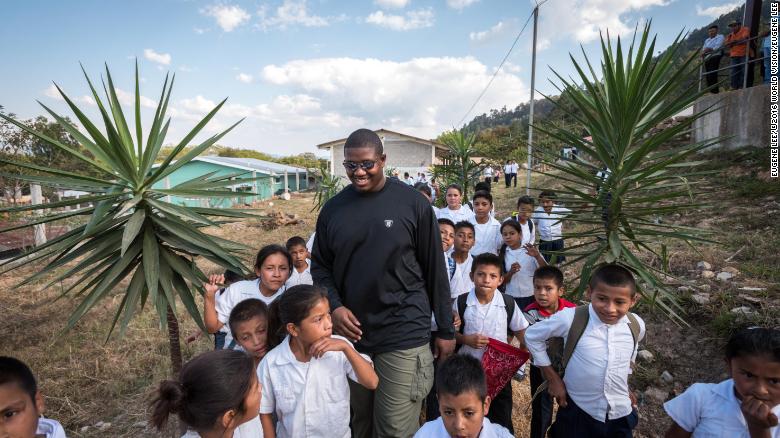Originally Posted: March 22, 2018
NFL player: What I saw in Honduras gives me hope for the global clean water crisis
By Kelvin Beachum Jr.
 NFL player Kelvin Beachum Jr. with students from World Vision’s Agua Blanca project and peer-to-peer tutoring program in San Juan, Honduras in 2016.
NFL player Kelvin Beachum Jr. with students from World Vision’s Agua Blanca project and peer-to-peer tutoring program in San Juan, Honduras in 2016.Editors note: “Kelvin Beachum Jr. is a husband, father and offensive lineman with the New York Jets. He and his wife, Jessica, live in Arizona with their two children. He is a World Vision Celebrity Ambassador. World Vision is a global Christian humanitarian organization that works with impoverished communities around the world. The opinions expressed in this commentary are his own.
(CNN) On the 25th anniversary of World Water Day, we celebrate that more than two billion people enjoy the benefits of having clean water around the world.
But we must also set new goals reinforced by sustainable action to completely solve the clean water crisis.
Water connects every aspect of life. Access to clean water provides proper hydration, work and entrepreneurial opportunities, improved health, and safe sanitation and living conditions. While billions have gained access to clean and safe drinking water, huge inequities remain. Globally, 844 million people lack access to clean water. According to the World Health Organization (WHO) an estimated 361,000 children under 5 years old die every year (nearly 1,000 a day) due to conditions surrounding dirty water, poor sanitation and hygiene.
This is an injustice. This must change. We must act.
On my expedition to Honduras with World Vision in the Summer of 2016, I visited the site of an economic empowerment project that provided savings plans, education for kids including an intensive technology training lab where students learn computer and internet skills, even graphic design, clean drinking water for an entire community, and water for agricultural irrigation. It is time to replicate these efforts globally to execute the bold vision of bringing clean water access to everyone.
This major city is running out of water 01:16
Organizations like this begin with the basic needs of a community and expand them to help provide sustainable solutions for community members to build out businesses and have access to basic needs. The water tank system that I saw in Honduras provided clean drinking water for an entire community, but also water for an irrigation system that helped feed the community and build a sustainable agricultural business. The people in this community are hard-working and intelligent. Their limitations are not a reflection of their efforts or capabilities, but rather a direct result of their lack of access to resources. That same water project is now projected to provide clean water access to more than 200,000 people.